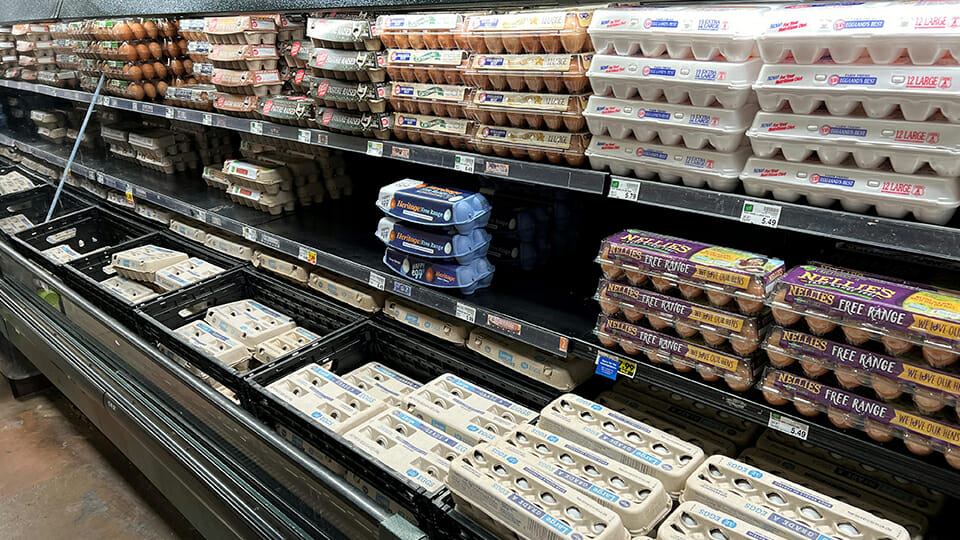Subscriber Benefit
As a subscriber you can listen to articles at work, in the car, or while you work out. Subscribe NowU.S. chicken producers say they want to do their part to bring down high egg prices by selling their 400 million surplus eggs to food producers.
But first they have to convince the Food and Drug Association to change the rule that prevents eggs laid by chickens in the meat industry to be used for human consumption.
Egg prices have surged over the past year thanks to the ongoing bird flu outbreak and the highest inflation in decades, prompting calls for a price-gouging investigation. The national average retail price of a dozen eggs hit $4.25 in December, up from $1.79 a year earlier, according to the latest government data.
The National Chicken Council trade group submitted a formal petition to the FDA on Thursday asking officials to drop a rule passed in 2009 that keeps chicken producers from selling their excess eggs because they aren’t refrigerated right away.
“Already faced with record egg prices, consumers might be hit even harder in their wallets as we head into the Easter season unless FDA provides us with a pathway to put these eggs to good use,” said Ashley Peterson, the trade group’s senior vice president of scientific and regulatory affairs.
The bird flu outbreak has had an outsized impact on egg prices because more than 43 million of the 58 million birds that have been slaughtered to help control the spread of the virus have been egg-laying hens. Egg farmers have also been grappling with high feed, fuel and labor costs that have contributed to the rising prices.
It’s not clear exactly how big of an impact the eggs chicken producers want to sell might have on prices because there are roughly 100 billion eggs a year produced in the U.S., so adding 400 million more to the market might not have a huge effect.
The FDA said it would review the Chicken Council’s petition and respond directly to that group. But concerns about food safety are what drove them to adopt the rule that prohibited the sale of the eggs in the first place.
When a broiler hatchery produces eggs, they are kept at 65 degrees until they are ready to be placed in incubators to be hatched. The FDA said in its rule that eggs that are going to be used for food need to be stored at temperatures below 45 degrees within 36 hours.
The Chicken Council said it believes the eggs would be safe because they would be pasteurized before they were used by food producers. The eggs that chicken producers don’t need to produce more chickens for meat production wouldn’t be sold to consumers in grocery stores. Instead they would go to makers of food products and processed eggs that are sold to bakers and other food companies.
The Chicken Council estimates that this FDA rule prohibiting the sale of these eggs costs chicken farmers about $27 million a year because currently the eggs are either thrown away, rendered or used for animal food.
But the United Egg Producers trade group said it would be a bad idea to relax food safety rules to allow eggs laid by chicken producers to be sold.
“The safety of eggs is always the priority for America’s egg farmers, as is firm compliance with all regulatory requirements related to food safety,” said Oscar Garrison, the egg trade group’s vice president of food safety regulatory affairs. “United Egg Producers opposes the petition by the National Chicken Council because it does not comply with the egg safety rule.”
Please enable JavaScript to view this content.


Special interest groups must keep their special interests in mind, notwithstanding the impact on consumers.
Disclamer: I’m not all familiar with this process. .
However, we continue to process food with drugs to control disease and I’m sure to build a godsila chicken. Our body won’t even allow us to drink foreign water. I work between the US and Mexico. Eggs there are marketed outside of coolers. I eat their eggs and stand tall. We have Pharmaed ourselfs into aliens living in fear if a virus.
Now we market 100s of natural powders from roots and pills to substitute the absence of natural nutrition. What a game. And we buy into it.